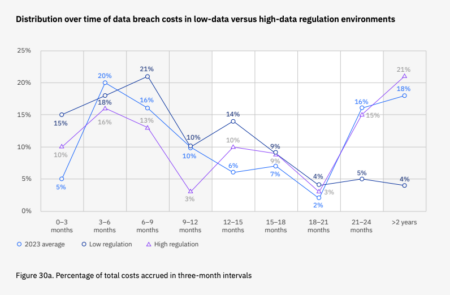
Our business would be severely challenged if we lost the ability to use our technology systems or get access to our data such as client information, current jobs or billing information. I expect you’re the same. You know what it’s like if there is even a small power outage or the internet is down, we all run around lost about how to function.
Now imagine that if you lost access to your systems for 48 hours? For a week or worse. Data keeps businesses going, so we need to do everything we can to protect it – just as we lock our doors and set an alarm when we leave our homes or vehicles…
Reputation in the New Zealand market, where everyone knows of everyone, is crucial. Rumours of a data breach can spread like wildfire amongst the community leaving reputation in tatters and a massive clean-up job in both the trust and capability aspects of the company.
Sometimes we think of cyber-attacks as being about the ‘big guys’, but it’s not just big businesses that need to worry about a breach, 43% of cyber-attacks in New Zealand are on small businesses (Accenture’s Cybercrime Study). Vigilance, understanding and knowledge is key.
The repercussions of a data breach extend far beyond the immediate aftermath. They often haunt businesses for years. Only 51% of data breach costs occur within the first year of an incident. The other 49% happen in year two and beyond.

Image source: IBM’s Cost of a Data Breach Report 2023
This post explains how the impact of a data breach has long-term consequences well after the data breach itself. A single breach can have enduring implications that impacts a business’ reputation, finances, and regulatory standing.
A Warning for New Zealand Businesses
The repercussions of a data breach extend far beyond the immediate incident. They can impact the financial health and reputation of a business for years, as well as its regulatory standing.
The true cost of a data breach is not always immediately evident and includes things like:
- Operational disruption
- Financial penalties
- Reputation damage
- Lost customers & acquisition challenges
- Regulatory consequences
These impacts can persist for years.
The Costs of a Data Breach
Last year, Latitude Financial, a New Zealand-based financial services company, had a major cyberattack resulting in the theft of the private information of 20% of the New Zealand population whose driving licenses they had on their database.
They spent approximately $81m dealing with the fall-out and to manage the follow-up.
They were fined by the regulator. Fines in Australia have been lifted to NZ$50 million. In New Zealand it is currently only $10,000, although this may be increased in the not-to-distant future with more pressure from the public.
They posted a first half loss of $105m, in large part attributed to the cyber breach.
It’s not just the cost of getting your data back or the fines. Costs can come long after an initial breach.
Lingering Impacts of a Data Breach
Operational Disruption
The aftermath of a data breach disrupts normal business operations. Companies must take remediation efforts and put in place enhanced security measures. These can divert resources away from core business functions.
The company feels the impact across departments, affecting productivity and efficiency. The ripple effect of operational disruption can extend for years. This impedes growth and hinders the organisation’s ability to adapt to market changes.
Financial Repercussions
The financial toll of a data breach is significant. Immediate costs include things like:
- Breach detection
- Containment
- Customer notification
Beyond those, businesses generally face long-term expenses. These relate to legal battles, regulatory fines, and reparations. Regulatory penalties are just one facet of the financial repercussions; others include potential legal actions from affected individuals adding to the monetary strain.
Reputation Damage
The impact on a business’s reputation is arguably the most enduring consequence. Customers lose trust in a company’s ability to protect their sensitive information. This loss of trust can result in a decline in customer retention, as well as acquisition difficulties and long-lasting damage to the brand image.
Rebuilding a tarnished reputation takes time and concerted efforts. These may involve public relations campaigns and enhanced security measures to reassure stakeholders of renewed commitment to data protection.
Customer Turnover and Acquisition Challenges
A data breach often leads to losing customers. Individuals lose confidence in the business’ ability to protect their personal information.
Acquiring new customers becomes challenging as potential clients are wary of associating with a brand that has suffered a breach. The prolonged effects on customer acquisition can hinder the company’s growth and its market competitiveness.
Regulatory Scrutiny
Regulatory bodies increasingly hold businesses accountable for safeguarding consumer data. A data breach triggers regulatory scrutiny. This may lead to fines and ongoing compliance requirements.
Regulatory authorities take a stringent stance on data security. As well as on companies that fail to meet cybersecurity standards. The fallout includes financial penalties. As well as increased oversight and mandatory security improvements.
It’s a sad truth, that the frequency and sophistication of cyber threats is also continuing to rise; criminals are getting smarter and AI is making it easier. Proactive cybersecurity measures are not just a necessity; they are a strategic imperative for safeguarding the long-term success of your businesses.
Protect Your Business – How Do You Score?
There are many ways that hackers can breach a network…and what is hard is that they are using technology all the time to improve their methods, so you can never think you are ‘done.’
Protect your business – ensure you have the right systems, processes and policies in place. Make sure your team understand their role.
Want to know where you are most exposed and most importantly, what your priorities should be?
Take your FREE Cyber Healthcheck here.
Or book a FREE Cyber Consultation to discuss how a Cyber Assessment can help your business.
Article adapted with permission from The Technology Press.